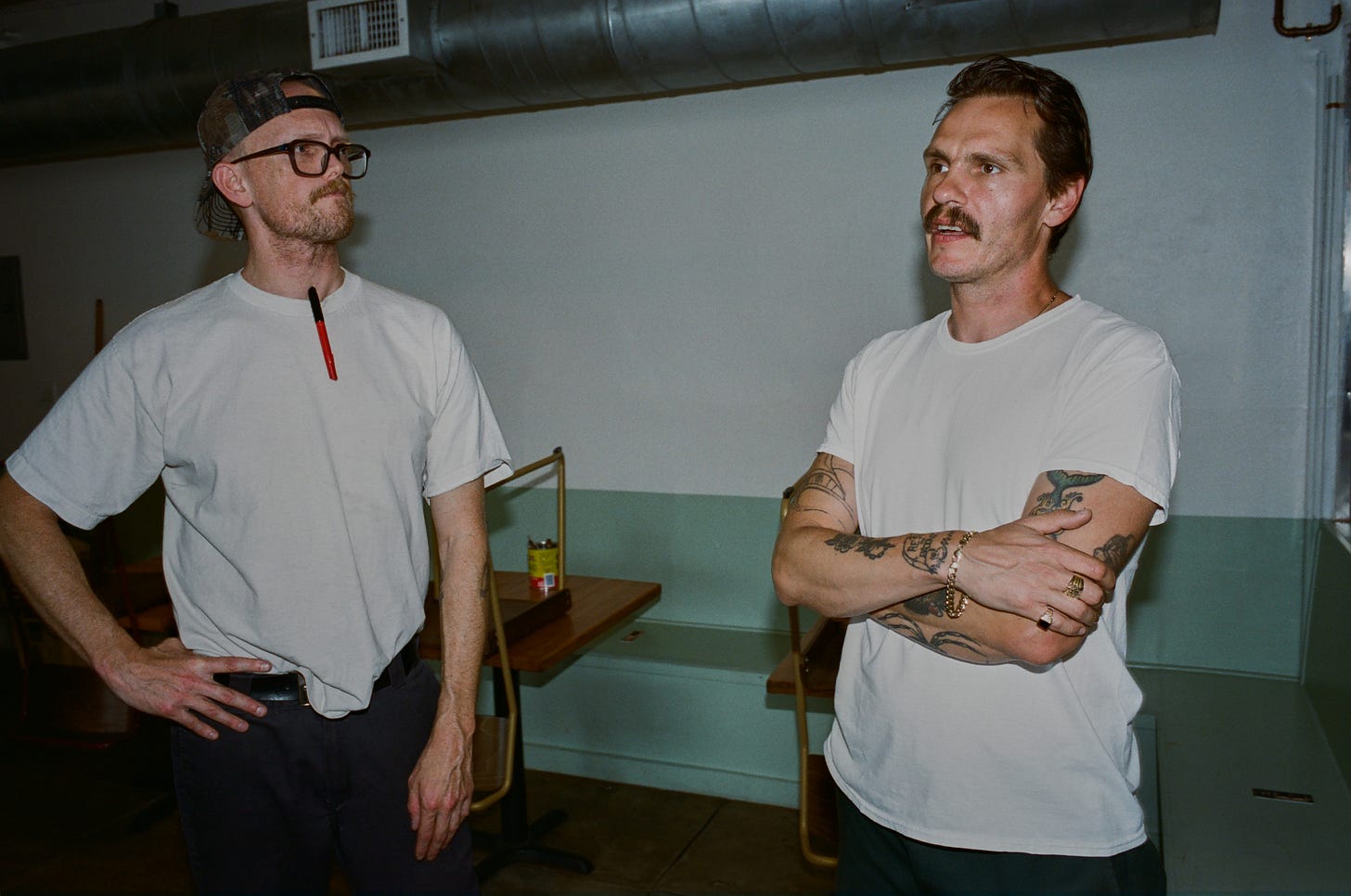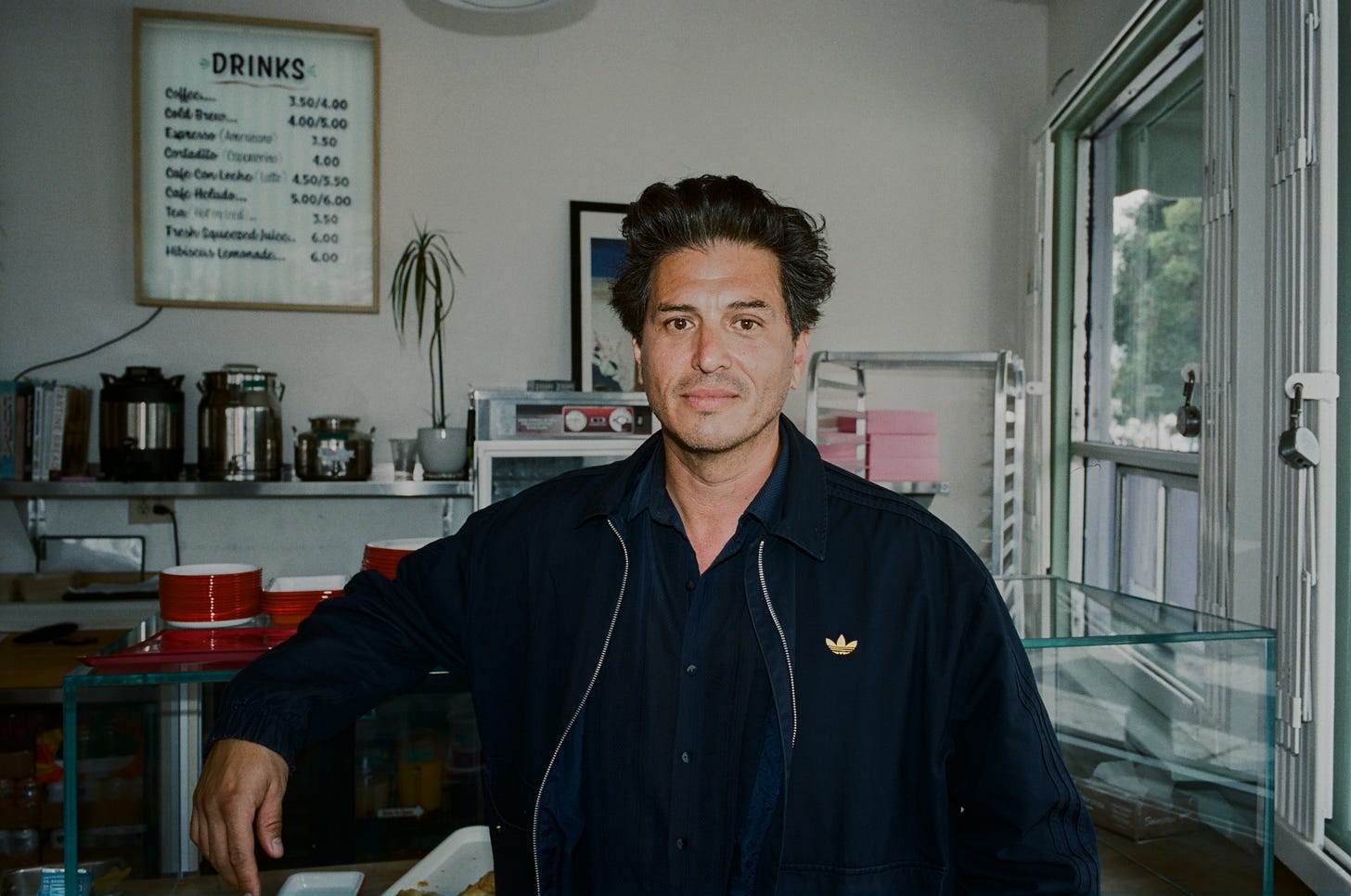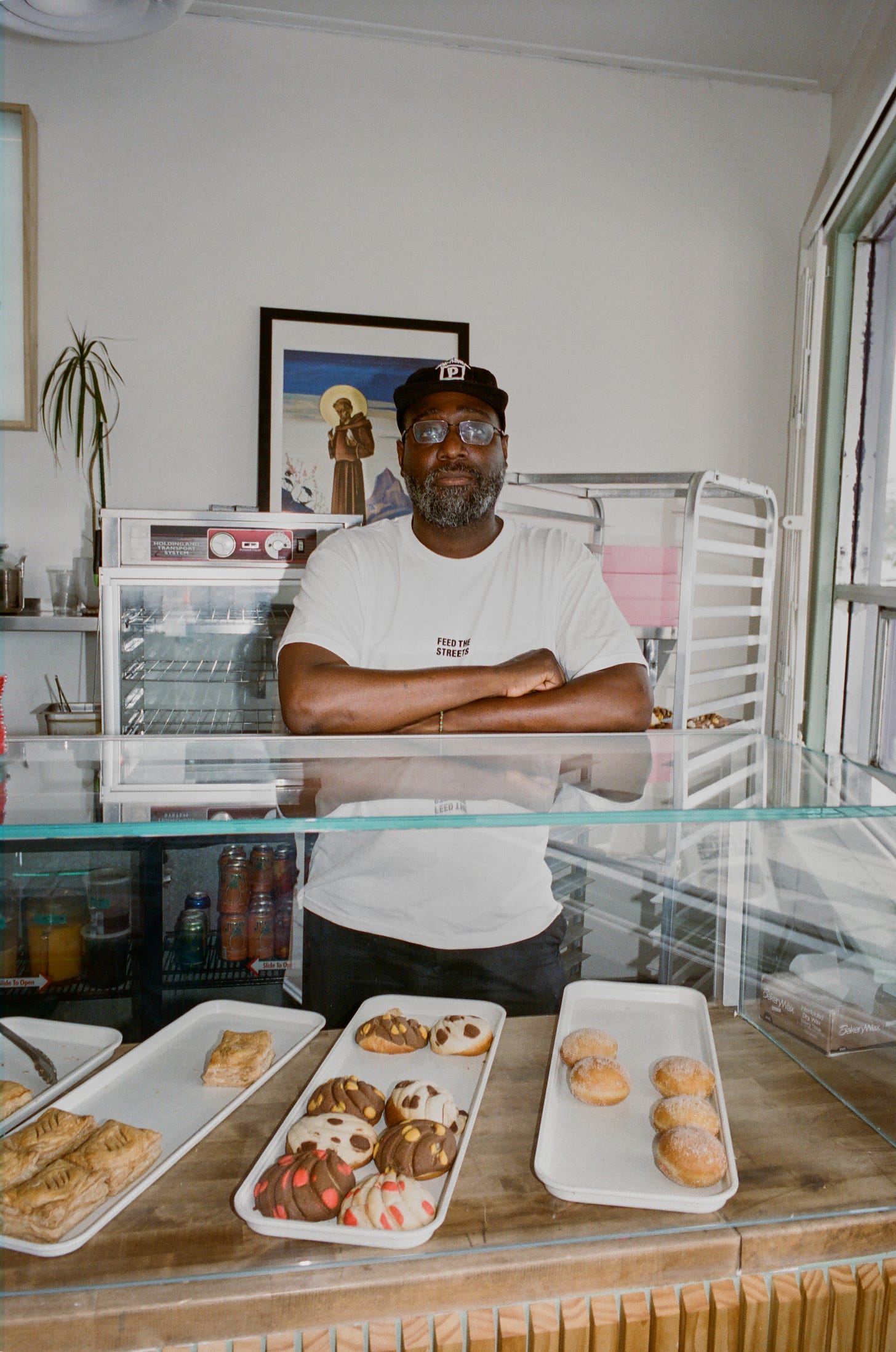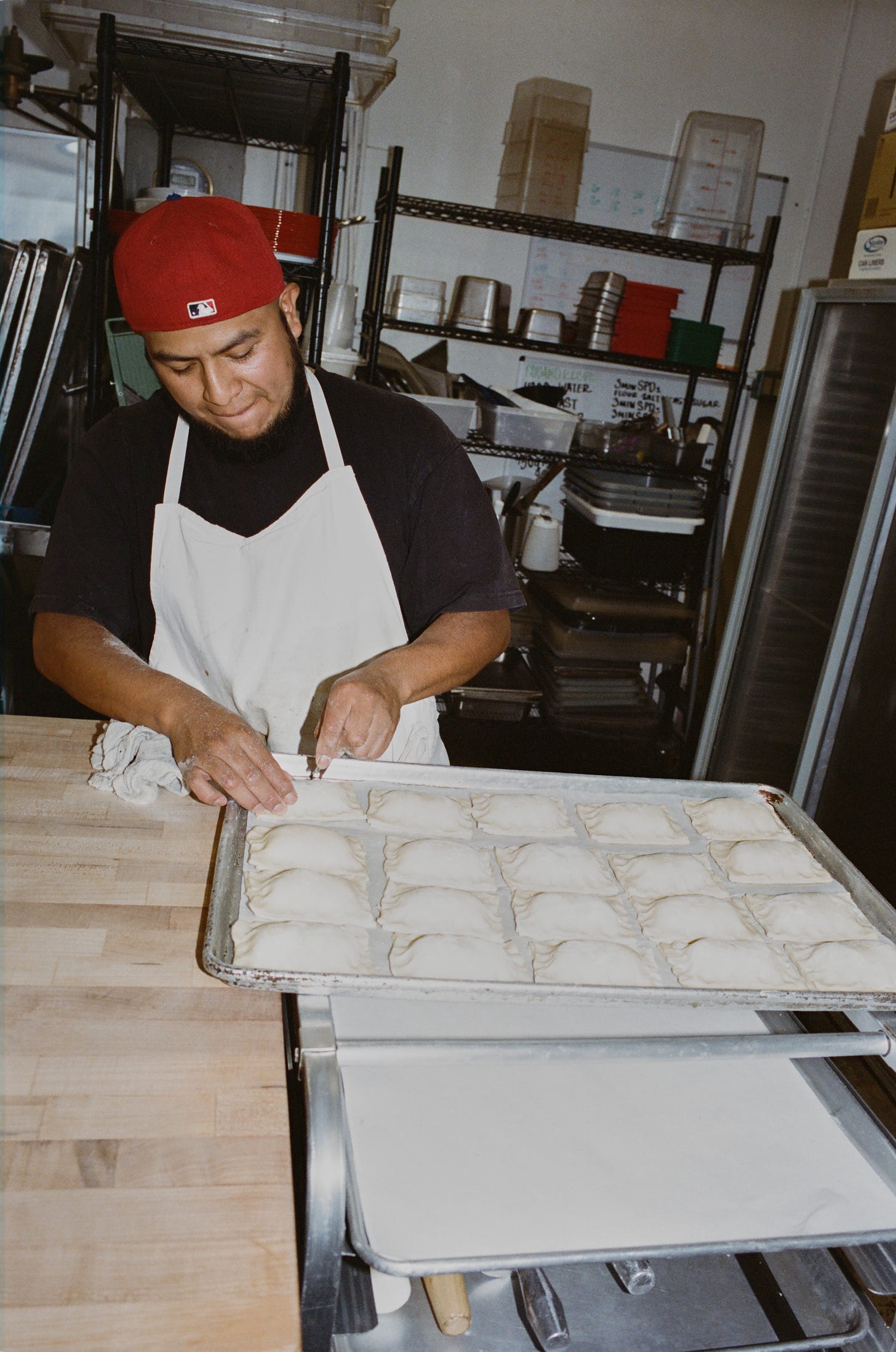Café Tropical is So Back, and Better Than Ever Before
The Silver Lake institution's new owners are uniquely positioned to shepherd its legacy and to improve upon it, too.
Photographs by David Gurzhiev
When Café Tropical suddenly announced that its doors were imminently and permanently closing last November, the community was distraught. The Cuban-ish bakery and café had been operating on the corner of Sunset and Silver Lake Boulevard since 1975, its keys belonging to nearly ten owners over almost 50 years. It became known for its guava-and-cheese pastelitos and its Cubanos, but most of all, as a beacon for the recovery community. A room attached to the restaurant, equipped with seating and a corkboard, has played host to countless AA groups and other addiction-related meetings for decades. “I was in tears because it was such a big part of my life,” says Danny Khorunzhiy, who was working as a program director at a nearby treatment center at the time. “There are so many places that are places, but how many places are there where people’s lives get turned around?” He thought there had to be a way to save it, or at least he needed to try.
“There are so many places that are places, but how many places are there where people’s lives get turned around?”
Khorunzhiy contacted the realtor about taking over the lease and began rounding up community members to get involved, many of whom he knew from attending meetings. He reached out to Ed Cornell, a chef and the co-founder of the D.C.-based ice cream brand Milk Cult, who had been working in the kitchen at Quarter Sheets. And he called Rene Navarrette, a production designer and restaurant industry insider who once worked alongside his brother, Fast Eddie, a well-known permit expeditor. Altogether, the three partners set out on a mission to reopen Café Tropical, which required cleaning up the financial mess that the former owner, Daniel Navarro, had created. Cornell guesses there were at least a million dollars in outstanding cash loans. “In order for us to legally purchase the business, we had to corral everyone who was owed money to sign off,” he says. “It was wild.” At the same time, they had to do all the footwork of trying to reopen—cleaning up, staffing up, dialing in recipes.
They took on other investors from the community, including Nicky Fisher of El Prado and Fluffy McCloud’s and Pascual Guachiac, who had been the pastry chef at Café Tropical before it shuttered. And they began putting together a team: Guachiac, Manny Contreras, the former head of operations across Café Tropical and now-closed sister restaurants Bolita and El Cochinito, and Toks Shoyoye from Tartine at Fred Segal as head of coffee. Miraculously, their efforts paid off. “A few weeks before we opened, we got the confirmation from the last lender,” Cornell says. “Because we had no idea of whether or not it was actually happening, we made zero announcements anywhere. We literally just unlocked the doors one day and texted a bunch of people the night before.” By mid-March, Café Tropical was up and running again, with Khorunzhiy (front-of-house) and Cornell (back-of-house) at the day-to-day helm.
Reopening the meeting space was gratifying for all three owners, who count themselves among Café Tropical’s community of recovering addicts. After it closed, the meetings moved to a church on Alvarado Street and Sunset Boulevard, whose roof collapsed in February, leaving many in recovery without a place to convene. Now that it’s back, Khorunzhiy says there are more meetings than before it shut down, and more community organizations are reaching out, including a recurring comedy show. (The meeting space is essentially free for community use; Café Tropical just requires a $25 deposit and to buy food and beverage from them, if needed.)
Now, two months in, the current shepherds are using their cheffy chops to improve upon beloved menu items and leaning into Café Tropical’s history to inspire new offerings. They’re making puff pastry in-house for their pastelitos instead of buying it frozen (as was previously done) and filling it with top-quality guava puree and a mix of cream cheese and crème fraîche. They brought back the guava-cheese pie—a specialty of former owner Donato Lopez, who ran the café from the early ‘90s until he passed away in 2016 and whom both Khorunzhiy and Navarrette got to know well—but amped it up from the old recipe, which called for the cheapest canned guava you can get. And they made the Cubano bread chewier and more flavorful by adding whole wheat Cairnsprings flour (the supplier for both Tartine and Quarter Sheets) into the dough.
Contreras started making polka-dot conchas while Cornell contributed fruit cream-stuffed doughnuts and the Ukrainian honey cake known as Medovik, California-fied with a seasonal fruit filling, into the pastry case. The latter is part of an effort to introduce a few Eastern European-leaning items to the menu, given the USSR’s political (and thus, culinary) influence on Cuba. Cornell can lean on Khorunzhiy for this, as he was born in Kyiv before moving to Los Angeles as a kid. He’s also recipe-developing a fairly priced (and sized) breakfast burrito and bringing in Kiyoshi Tsukamoto, the former pastry chef at Konbi, to consult on croissants.
The margins on everything need to be good for the business to work, so Cornell has been crunching the numbers. “The thing that I would treasure the most about being associated with the food [here] is that people feel like it’s priced appropriately,” he says. “It’s an interesting proposition to run any food business in America today that’s not trying to associate with the aspirational. I’m not against that; I just don’t think the stuff that I do, or this, will ever be that, and I think that should be okay.” Since reopening, Café Tropical has even been able to lower the prices of certain items. A pastelito costs $4, the breakfast sandwich is $10, and the Cubano is $16.
“The thing that I would treasure the most about being associated with the food here is that people feel like it’s priced appropriately.”
Cornell’s landing at Café Tropical is more fitting than meets the eye. When it opened in the mid-70s, it was called Tropical Ice Cream & Bakery. (The first owners, a set of Cuban brothers named Evelio and Adolfo, wanted nothing to do with Cuba for political reasons, and so it wasn’t until years later that Cuban items were introduced to the menu.) Soon enough, 2900 Sunset Blvd will be an ice cream shop yet again. Cornell is currently fine-tuning his scoop flavors—including strawberry, banana, sour cream-and-honey biscuit, Grape Nuts, and a seasonal stone fruit sorbet—which he’ll start serving in early June. Accordingly, Café Tropical will come back alive at night and offer chicken wings with several seasonings (jerk, guava, and mumbo sauce—a nod to Cornell’s D.C. roots).
It’ll be something of a return to the glory days that Khorunzhiy and Navarrette remember when Lopez was running point, and people just out of nighttime meetings could hang out, smoke cigarettes, have a cup of coffee, and eat leftover pastries. “At one point, there were 25-30 meetings a week that happened here from every different fellowship, and it was always open. It was like Cheers for people that weren’t drinking,” Khorunzhiy says. (Also coming soon: Monday night birria pop-ups with Carlos Jaquez of Birria Pa La Cruda).
Today, Café Tropical works because it’s always worked and because its new stewards are members of the pre-existing community. Cornell, Khorunzhiy, and Navarrette inherited a decades-deep customer base: neighborhood folk, meeting regulars, and those seeking a good cup of coffee or a Cubano. As they make improvements, like the house-made puff pastry, and add new offerings into the mix, they have buy-in from their patrons. Since they've stepped up to the plate, customers have shared lore about canvassing in the back room for the DNC or about when Tropical was the only coffee shop between West Hollywood and downtown on Sunset Boulevard through the early ‘80s. “Everybody has a story,” says Khorunzhiy, who you’ll often find taking orders behind the register. “When somebody is like, ‘I’ve been coming here since I was 7,’ I’ll drop everything I’m doing and sit with them.” Shoyoye is finalizing Café Tropical’s proprietary coffee bean blends with Collage Coffee. They plan to name the drip Donato and the espresso blend Evelio.

As the saying goes, if it ain't broke, don't fix it. Only minor changes were made to the space before the reopening. They cleaned up, repainted, pulled out the tilting deck ovens and replaced them with convection ovens, and redid the lightbox sign in the meeting room with Tropical’s original font—found in an Ed Ruscha photo from 1985. Everything else remains the same, which is how it should be as Café Tropical comes up on its 50th anniversary next year. “It’s completely surreal,” says Khorunzhiy of now being on the other side of the counter after decades of patronage. “How often is it when a place helps save your life, and then you get to be part of saving the place?












Love this! This makes my heart happy. I’m sure my Tio Nato is dancing in heaven. Thank you for keeping Cafe tropical alive the place he cherished and loved most. ❤️
Love this reporting 👏